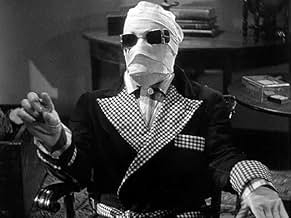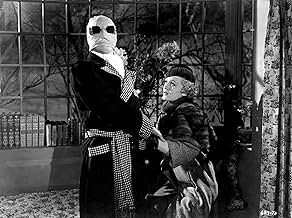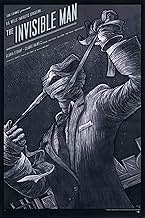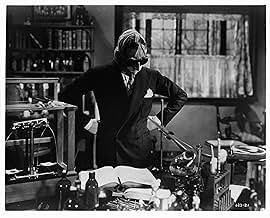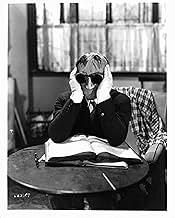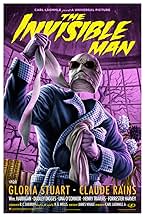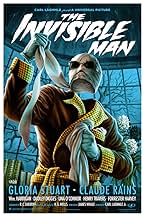IMDb RATING
7.6/10
43K
YOUR RATING
A scientist finds a way of becoming invisible, but in doing so, he becomes murderously insane.A scientist finds a way of becoming invisible, but in doing so, he becomes murderously insane.A scientist finds a way of becoming invisible, but in doing so, he becomes murderously insane.
- Awards
- 4 wins & 2 nominations total
Robert Adair
- Detective Thompson
- (uncredited)
Edgar Barrier
- Radio Announcer
- (uncredited)
Ted Billings
- Villager Playing Darts
- (uncredited)
Walter Bonn
- Townsman
- (uncredited)
Walter Brennan
- Bicycle Owner
- (uncredited)
Robert Brower
- Farmer
- (uncredited)
Featured reviews
What you really have to appreciate here is Rain's performance in the title role. Using very little more than just his voice, Rains made this character completely believable, even as the character declined into a state of madness. The special effects may not be quite up to today's standards, but they still come off pretty well, which is remarkable given the amount of time that has passed. This is one of those films that could not be changed without diminishing it. It is a real must-see for anyone interested in either the horror or sci-fi genres.
This film version of the H.G. Wells science fiction classic works very well. It has a number of strengths, but it benefits most of all from James Whale's direction, creativity, and technical excellence. Both the flashier aspects of the movie (such as the "invisibility" effects) and also most of the basic elements are done with skill.
The story is for the most part based on the one main idea of "The Invisible Man" who combines his scientific genius with a generous supply of madness. The story is interesting enough in itself, and of course it provides all kinds of opportunities for visual tricks. Whale hits just the right balance in making good use of these opportunities without over-indulging himself.
The visual effects themselves are of excellent quality, and they are far better than all but the very best of the present-day computer imagery. While it is usually rather easy to spot which parts of a movie are computer-generated, Whale's effects are all but seamless, with the exception of a handful of brief moments. They are often quite impressive, without resorting to tired devices, such as explosions and the like, in order to impress those with shorter attention spans.
Claude Rains does quite well for having such limitations on what he could do. The rest of the cast is solid, if mostly unspectacular, letting the story do the work. Una O'Connor somewhat overdoes it with the screaming this time, but otherwise the characters are believable. The acting may seem slightly quaint to those who are accustomed to the pretentious styles of the present generation of performers, but it's certainly better than the grating, self-important performances in some of the recent movies of the same genre.
While the story does not have the thematic depth or the suggestive imagery of horror classics like "Frankenstein" or "Dracula", this adaptation gets everything it can out of the material, telling the story in an entertaining fashion and with technical skill.
The story is for the most part based on the one main idea of "The Invisible Man" who combines his scientific genius with a generous supply of madness. The story is interesting enough in itself, and of course it provides all kinds of opportunities for visual tricks. Whale hits just the right balance in making good use of these opportunities without over-indulging himself.
The visual effects themselves are of excellent quality, and they are far better than all but the very best of the present-day computer imagery. While it is usually rather easy to spot which parts of a movie are computer-generated, Whale's effects are all but seamless, with the exception of a handful of brief moments. They are often quite impressive, without resorting to tired devices, such as explosions and the like, in order to impress those with shorter attention spans.
Claude Rains does quite well for having such limitations on what he could do. The rest of the cast is solid, if mostly unspectacular, letting the story do the work. Una O'Connor somewhat overdoes it with the screaming this time, but otherwise the characters are believable. The acting may seem slightly quaint to those who are accustomed to the pretentious styles of the present generation of performers, but it's certainly better than the grating, self-important performances in some of the recent movies of the same genre.
While the story does not have the thematic depth or the suggestive imagery of horror classics like "Frankenstein" or "Dracula", this adaptation gets everything it can out of the material, telling the story in an entertaining fashion and with technical skill.
The Invisible Man should rank among one of the best horror films of the 20th century. I was amazed at the special effects, even more when I think how computers and digital images for FX where but a dream in the 30's. Unlike most films today, where explosions and hurtling asteroids are ,perhaps, the main actors in film now, The Invisible Man relies on a great plot to counter the effects. This is a world where scientific discoveries and lust for power take hold of mankind. The absence of law and restraint disappear along with the man. This film, directed by James whale, allows for the viewer to compare and contrast Mr. Whale's other masterpiece, "Frankenstein." But one should also watch The Invisible Man as a powerful film of its own right.
I actually saw The Invisible Man (1933) shortly after I saw the James Whale bio-pic Gods and Monsters (1998), starring Ian MacKellan and Brendan Fraser. So it was with that image of the director in my head that I watched this film. Claude Rains (Casablanca) is perfectly cast as the mad scientist/invisible man. The remainder of the cast, though not really challenged much, are more than serviceable in what they are required to do. As has been mentioned by most of the other posters, the special effects hold up rather well even today. An amazing feat considering the film is over 70 years old! The DVD has several interesting documentaries / commentaries that made me appreciate not only this film's entertainment value but its historical significance as well.
Writing about 30's Black-And-White movies can be difficult, as they need to be considered in light of the era the films were made. You have to adopt the mind-set of some-one viewing it for the first time, without the baggage of umpteen remakes and special effects improvements, to remain objective. Here goes:
Claude Rains does a good job with a mainly "speaking" part - lots of emotion and command there. Una O'Connor as the Innkeepers wife does a bit too much shrieking for my liking - but required "reaction" acting fodder for the time, I assume.
The effects still hold up, and must have been cutting edge at the time. The storyline covers all the basics of the Wells Novel - a quest for knowledge and power, alienation and drug inducessed madness. It's an enjoyable watch with good pacing and steady performances throughout. A sort of lazy Sunday afternoon type of movie.
Universal's take on a British Pub raises a smile, with some fantastic looking weathered-faced locals populating the place. I love the way the gag with a local "fake-playing" a coin driven piano gets a roaring laugh (as if that's the first time the pub's drinkers have seen it). However, the British film-industry was putting out the same type of stereotypes, so Universal can be forgiven there.
A part of Sci-Fi/Horror movie making history, and worth watching for this fact alone.
Claude Rains does a good job with a mainly "speaking" part - lots of emotion and command there. Una O'Connor as the Innkeepers wife does a bit too much shrieking for my liking - but required "reaction" acting fodder for the time, I assume.
The effects still hold up, and must have been cutting edge at the time. The storyline covers all the basics of the Wells Novel - a quest for knowledge and power, alienation and drug inducessed madness. It's an enjoyable watch with good pacing and steady performances throughout. A sort of lazy Sunday afternoon type of movie.
Universal's take on a British Pub raises a smile, with some fantastic looking weathered-faced locals populating the place. I love the way the gag with a local "fake-playing" a coin driven piano gets a roaring laugh (as if that's the first time the pub's drinkers have seen it). However, the British film-industry was putting out the same type of stereotypes, so Universal can be forgiven there.
A part of Sci-Fi/Horror movie making history, and worth watching for this fact alone.
Did you know
- TriviaOn the DVD short documentary, Claude Rains' daughter Jessica Rains tells of a time when her father brought her to see a re-release of this movie in the theater in Pennsylvania in 1950. It was bitterly cold and his face was completely covered by a hat and scarf. When he spoke to ask for the tickets, the attendant immediately recognized his voice and wanted to let them in for free. Rains was quite upset at this and demanded that he pay full price.
- Goofs(at around 2 mins) Though the music at the pub comes from a coin-operated player piano, it, along with everyone talking in the pub, stops short at the startling arrival of the Invisible Man.
- Quotes
The Invisible Man: We'll begin with a reign of terror, a few murders here and there, murders of great men, murders of little men - well, just to show we make no distinction. I might even wreck a train or two... just these fingers around a signalman's throat, that's all.
- Crazy creditsClaude Rains is the only actor in the film whose character is identified in the credits. The roles the other actors play are not identified, even though the cast is listed twice: at the beginning and at the end. Rains is billed as "The Invisible One" in the opening credits and as "The Invisible Man" in the closing credits.
- Alternate versionsWhen the film was released to home video, Universal Studios replaced a snippet of music heard on the radio when Dr. Kemp is reading a newspaper in his house, and the Invisible Man enters through a set of French doors. Universal was unable to secure the rights for the original music and replaced it, covering the original sound effects (the sound of the newspaper and the door latch) in the process. The original music and missing sound effects were restored to the 2012 blu-ray audio.
- ConnectionsFeatured in Sherlock Holmes et la voix de la terreur (1942)
Details
Box office
- Budget
- $328,033 (estimated)
- Gross worldwide
- $27,105
- Runtime
- 1h 11m(71 min)
- Color
- Aspect ratio
- 1.37 : 1
Contribute to this page
Suggest an edit or add missing content



